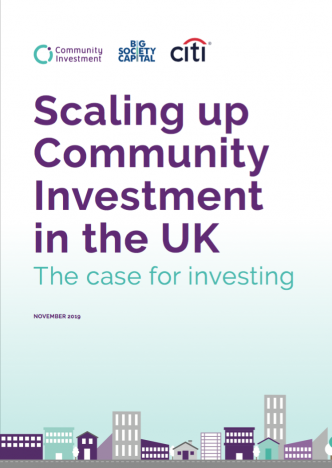Report: Community Development Finance Institutions could increase their lending to £250 million annually to underserved small businesses.

A new report by the Community Investment Steering Group* today presented a vision of “Significant social and economic impact in underserved communities, created through sustainable capital invested at scale by a resilient enterprise lending CDFI sector.”
The report, Scaling Up Community Investment in the UK, sets out the economic, social and financial case for investing in CDFIs (responsible finance providers).
It describes “quantitative and qualitative evidence on the social and economic impact CDFIs are creating,” and presents an “ambitious but realistic target” to double CDFI annual lending growth to £35 million a year on average.
With the “right supportive environment” the market can reach £250 million lending per year to underserved small businesses, the report finds, creating or safeguarding 90,000 businesses and 150,000 jobs, and adding £6.3 billion to the UK economy.
Responsible Finance’s chief executive, Theodora Hadjimichael, said:
 “We welcome this new report which identifies the unique role our members have in supporting small businesses. The report highlights how the responsible finance sector could have an even bigger impact on driving inclusive growth, supporting businesses and creating jobs if the right tools are in place.
“We welcome this new report which identifies the unique role our members have in supporting small businesses. The report highlights how the responsible finance sector could have an even bigger impact on driving inclusive growth, supporting businesses and creating jobs if the right tools are in place.
“We endorse the calls to action made in the report, which include:
- Develop dedicated funding sources for enterprise lending CDFIs.
- Actively consider the role of CDFIs to deliver inclusive growth at the Combined Authority, Local Authority or Local Enterprise Partnership level.
- Develop new funding programmes through the British Business Bank to support CDFIs to deliver to underserved small businesses.
“As well as for investors to:
- Set out the conditions on which they will invest in CDFIs by coming together through UK Finance.
- Develop a shared understanding of investors’ broad diligence requirements through a collaborative working group with CDFIs.
“Acting on these recommendations will create a supportive operating environment for enterprise lending CDFIs, and catalyse the scale needed to reach even more small businesses which are unable to access mainstream finance.
“Enterprise lending CDFIs are driven by making a positive impact on their communities, and therefore they invest in those businesses that have the potential to make a significant local contribution through new job creation, regenerating the high street or offering a really innovative product.
“Often these businesses cannot secure a bank loan because they are small scale or start ups, but they do find success with their local CDFI. These place-based investments that CDFIs specialise in drive inclusive growth across communities in the UK.
“In 2018 enterprise lending CDFIs invested £85 million into the start up and growth of 5,310 small businesses in the UK. We know there is significant unmet demand from businesses such as Hypermotive [case study below]. There is also an increasing demand for finance to be ethical, transparent and responsible. And as the Community Investment Steering Group’s report demonstrates, there is strong evidence that given the right tools, enterprise lending CDFIs can lead the way on both of these fronts.
“With the general election coming, any new government wishing to support small businesses – the backbone of our economy – must take note of the calls to action in this report and the vital role of enterprise lending CDFIs.”
Case study: From bank says “no” to 17 jobs and international recognition for zero-emission automotive engineering firm
A Leicestershire-based automotive engineering firm is helping to deliver the next generation of zero-emission vehicles and became a first-tier supplier to automotive manufacturers within its first two years. But the business had been rejected for the working capital it needed to grow – until a CDFI stepped in to fill the gap.
Hypermotive, of Lutterworth, specialises in delivering bespoke automotive engineering solutions for electric vehicle integration.
Its three divisions (electric vehicle, fuel cell and manufacturing) work with automotive original equipment manufacturers (OEMs), niche vehicle manufacturers, technology developers and the biggest names in the motorsport industry.
Established in June 2016 by Adam Huckstep and Jeremy Bowman, the 17-strong firm was originally set up to work on low carbon vehicle technologies such as batteries, supercapacitors and fuel cells.
But after a large engineering group went into insolvency Hypermotive saw an opportunity to recruit eight highly skilled and experienced engineers, and really significantly ramp up their capability and capacity. Adam and Jeremy were also joined by seasoned professionals Brad O’Nians and Liz Harber who have helped create a strong management team, driving Hypermotive’s growth.
With this influx of talent, combined with difficulties in getting good quality prototypes and low-volume manufacturing, Hypermotive’s management team decided to take manufacturing in-house. This side of Hypermotive under the guidance of Brad O’Nians has developed into a crucial strand of the business and the firm is now a first-tier supplier to automotive OEMs as well as supplying to Formula One.
This move not only strengthened client relationships but, thanks to the high output and quick turnaround time of manufacturing, the revenue generated has helped to stabilise the less predictable or commoditised engineering services side of the business.
This fast-paced growth hasn’t been without its challenges. The firm was invited to tender for a large European manufacturing contract, but required additional working capital to do so – and its own bank and a number of other lenders rejected its application primarily due to its short trading history. Hypermotive turned to responsible finance provider, Enterprise Loans East Midlands (ELEM / First Enterprise), which after an application process and appropriate diligence provided a £100,000 loan, giving the business the cash flow and confidence it needed to tender.
What next?
- Read more about the Scaling Up Community Investment in the UK report here or download the full report (pdf) here.
- * The Community Investment Steering Group is a representative range of stakeholders brought together by Big Society Capital and Citi. The group assembled representatives from the CDFI sector, small businesses, banks, investors, foundations and thought leaders.
- Find a responsible finance provider (community development finance institution) through our Finding Finance website.
